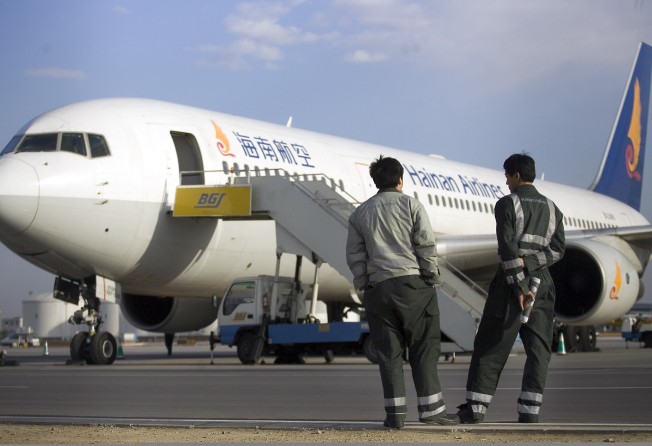China’s Hainan Airlines steps up international push with 24 billion yuan private placement

Hainan Airlines is stepping up its international expansion with 11 billion yuan (HK$13.7 billion) in aircraft acquisitions on the cards, its second major purchase in three weeks, as the mainland’s fourth-largest carrier strives to catch up with its bigger competitors at home and abroad.
Hainan Airlines told the Shanghai stock exchange on Monday night that it would raise up to 24 billion yuan in a private placement to fund fleet expansion, increase its stake in a sister airline and repay bank loans.
The proceeds will finance the acquisition of 37 new jets – including Boeing 737, Boeing 787 and Airbus 330 aircraft. The fleet expansion, due to be completed in 2018, would bring in 9.7 billion yuan in additional revenue a year, it said. The investments are part of a fleet expansion plan approved by the Civil Aviation Administration of China (CAAC) that allows Hainan Airlines to purchase 105 planes between 2014 and 2018.
“China’s aviation market and macroeconomic environment continue to look optimistic,” the carrier said in the statement. “[The fundraising plan] will further enhance the company’s operational capacity, market share, economy of scale, laying the foundation to achieve the strategic goal [to be a global carrier].”
The latest purchase plan comes on the heels of an order three weeks ago for 30 Boeing 787-9 Dreamliner aircraft with a catalogue price of US$7.7 billion, to be delivered by 2021. Actual prices paid are subject to negotiation and are often kept confidential. Some of the Boeing 787-9 purchases would require further CAAC approval, a company spokesman said.
Overseas markets contributed 4 billion yuan, or 12.6 per cent, of Hainan Airline’s revenue last year. That ratio made it the least globalised carrier on the mainland. By contrast, Air China, China Southern Airlines and China Eastern Airlines earned between 24 and 35 per cent of passenger income from overseas flights last year.
“Hainan Airlines is a latecomer to the international market, where it has met with fierce competition from domestic and international peers, lacking adequate market resources,” Shanghai-based Industrial Securities said in a note to investors yesterday. “The company therefore has differentiated its international strategy, snapping up niche markets.”
Hainan’s provincial government will remain the airline’s controlling shareholder via interests held indirectly, but see its stake diluted to 22.6 per cent from 34.8 per cent after the share issuance.
Hainan Airlines’ shares opened 10 per cent higher yesterday at 4.80 yuan, immediately reaching the 10 per cent upper limit in daily price movement, in its first trading day after a half-month suspension.
As part of a pledge that parent HNA Group made in 2012 to slash internal competition among sister airlines, Hainan Airlines will use 8 billion yuan raised from the share placement to acquire a 48.2 per cent stake in Tianjin Airlines, which operates 87 jets and is among the top three carriers in Tianjin, Inner Mongolia and Xinjiang, according to the statement.
Stakes in other HNA Group carriers, including West Air, Beijing Capital Airlines and Hong Kong Airlines, will also be transferred into Hainan by August.